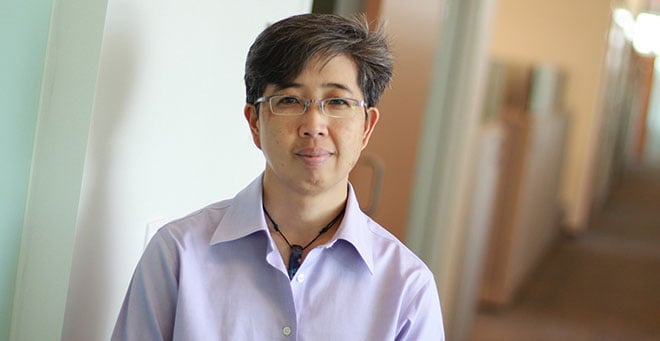
Jennifer Tjia, MD, MSCE, knows from her experience as a researcher and geriatrician how demanding the role of caregiver can be and how structural barriers impact patient outcomes. She wants to see research that drives solutions to health inequities.
The second community convening of the Equity in Caregiving Project, a $3.8 million, five-year grant from the National Institutes of Health, which Dr. Tjia, professor of population & quantitative health sciences, co-leads, aims to advance the conversation about what challenges family and clinical caregivers of people with serious illness are experiencing.
The community convening will be held 10 a.m. to noon March 28 in the Faculty Conference Room S1-342 at UMass Chan Medical School. A Zoom option is available and registration is requested.
Featured panelists include:
- Family caregivers
- Nancy McCool, LICSW, ACHP-W, APHSW-C, a palliative care social worker at UMass Memorial Medical Center
- Jeevarathna Subramanian, MD, associate professor of medicine and a hospitalist at UMass Memorial Medical Center
- Valerie Zolezzi-Wyndnam, JD, Owner/CEO of Promoting Good
- Brian Gibbs, PhD, associate professor of emergency medicine and vice president and chief of diversity, equity and inclusion at UMass Memorial Health
Caregiving is stressful. Up to 20 percent of caregivers retire early or quit their job; 22 percent exhaust short-term savings; 20 percent have late or unpaid bills; and 11 percent are unable to afford basic expenses like food, according to Tjia.
The UMass Chan team is conducting a mixed-method study for the Equity in Caregiving Project, collecting quantitative data and combining it with qualitative case studies.
“We’re really trying to come up with some sort of a solution, something we can do to make this better together: not just from the research side, not just from the hospital side, not just from the patient or caregiver advocacy side, but together,” said Tjia.
The project’s first community convening was held in October. Tjia said that one theme that emerged was that sometimes good things happen for caregivers. “At least here with clinicians, they see what’s happening and they’re doing their best. They want to be part of trying to make it better for everybody,” she said.
But Tjia added that it’s hard to get everyone in the room at the same time to share perspectives. Family caregivers may not be able to leave work, or travel, or find someone to care for their children when they need to tend to someone who is sick. Clinicians also have busy schedules.
“Our grant is really about structural racism. It’s about who can be in the room at the time when decisions have to be made in the hospital,” said Tjia. “But even this convening is a practice of inclusion too. Even in trying to have this dialogue in these forums, we’re all learning, acknowledging the practice of inclusion is part of even having the dialogue.”
To register for this event, visit the Equity in Caregiving Project website.
